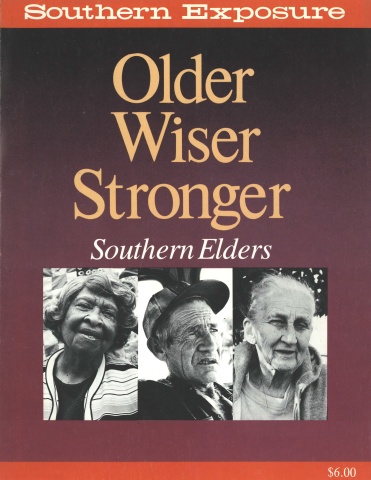An Experience with Death

This article originally appeared in Southern Exposure Vol. 13 No. 2/3, "Older Wiser Stronger: Southern Elders." Find more from that issue here.
Many years ago, when we were discussing a man who was being kept alive artificially after any prospect of a useful or satisfying life was past, my mother remarked, "If you let that happen to me, I'll come back and haunt you!"
When, at age 95, she was in a nursing home, bedridden, almost blind and deaf, and unable to speak coherently, my father came to visit her each afternoon, and to give her supper. There was much warmth and tenderness between them, and this continued to give meaning to her life.
At length as her condition deteriorated she decided that she had gone far enough. Her only recourse was to decline food. The nursing home responded with force-feeding — a brutal process. My father protested. "Offer her food," he said. "Give her every consideration, but do not force her!" When they ignored his wishes, he brought them a copy of an article which Mother had written years before, arguing that a person should be free to end his/her own life when his/her physical condition becomes hopeless.* Still they persisted, so my father and brother and I jointly called the doctor, saying "Get the feeding stopped or get her out of there!" This time they stopped, and a few days later Mother died in peace.
I took the death certificate to the county health office while my brother fetched a box from the Friends Burial Committee. When we arrived to claim the body the woman in charge exclaimed she had never heard of such a thing! She had called a funeral director who arrived the same time we did. An unusual confrontation. The funeral director graciously turned to the woman in charge and said, "They know what they're doing," then bowed himself out.
We lifted Mother's body into the box and I took it home in my station wagon. In the morning my daughter-in-law and I took her body to the medical school as she had requested. Mother had been firm about this. She was a biologist and thrifty, too. She had said she didn't want to have her body wasted. The medical school would have paid for transportation but this was something I could do for her, a meaningful privilege. At the medical school we lifted Mother's body out of the box, which we took back for future use.
That afternoon my niece was being married in a nearby city. We all went. The ceremony was of a Quaker type in which there is no presiding minister, the speaking being done by the principals and by others who feel moved to speak. This ceremony became a joint celebration of my mother's life and her granddaughter's marriage and was a deeply moving occasion. My father spoke of the "almost unbearable joy" which he felt in the sense of continuity.
The next evening we held a Memorial Meeting in the community where Mother had spent most of her life. Family and friends shared their thoughts and memories and extended fellowship and support to one another. That too was a memorable occasion which helped to deepen the quality of our lives.
* "On Drinking the Hemlock," by Lucy G. Morgan. Written in 1927, it was printed in the December 1971 issue of The Hastings Center Report (The Hastings Center: Institute of Society, Ethics and the Life Sciences, 360 Broadway, Hastings-on-Hudson, NY 10706.)
Tags
Ernest Morgan
Ernest Morgan, 79, has long been an active proponent of the hospice concept. This article is from Dealing Creatively with Death: A Manual of Death Education and Simple Burial (listed with annotation in Resources), published by Celo Press, Burnsville, NC28714. (1985)